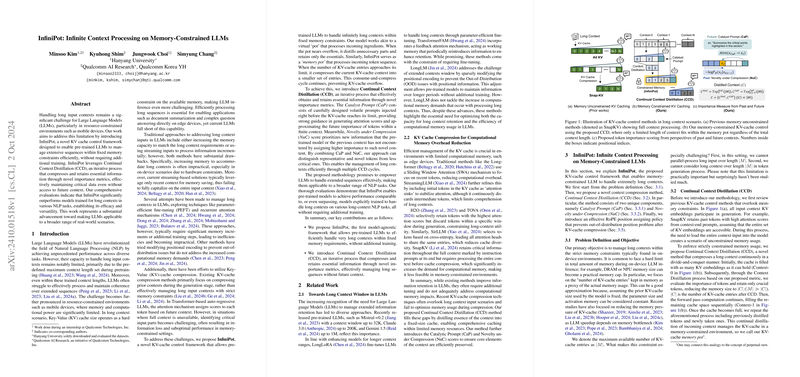InfiniPot: Enhancing LLMs in Memory-Constrained Environments
The paper "InfiniPot: Infinite Context Processing on Memory-Constrained LLMs" presents a novel framework aimed at addressing the limitations of LLMs in handling long input contexts within memory-restricted environments, such as mobile devices. The proposed InfiniPot framework is centered around a Key-Value (KV) cache control mechanism that efficiently manages extensive sequences without requiring additional training. The framework is built upon the Continual Context Distillation (CCD) process, which utilizes innovative importance metrics to compress and retain essential information from input data.
Key Contributions
The paper outlines several significant contributions:
- InfiniPot Framework:
- A model-agnostic framework that efficiently handles long contexts within fixed memory budgets.
- InfiniPot operates by processing token sequences in a virtual memory ‘pot’. When the pot is full, it compresses the KV-cache to retain only essential entries.
- Continual Context Distillation (CCD):
- CCD exploits novel importance metrics to repeatedly compress the context, ensuring crucial information retention.
- Introduces the Catalyst Prompt (CaP) and Novelty under Compression (NuC) score to differentiate and prioritize context components.
- Efficient Positional Encoding:
- The Context-Reset Rotary Positional Embedding (CR-RoPE) ensures positional stability, mitigating out-of-distribution issues in token positions.
Empirical Evaluation
The paper provides comprehensive evaluations demonstrating InfiniPot's capabilities. Notably, the framework significantly outperforms models explicitly trained for long contexts across various NLP tasks. The use of LongBench, a multi-task benchmark, and Needle In a Haystack (NIH) tests further highlights the ability of InfiniPot to manage extended sequences efficiently.
Strong Numerical Results
InfiniPot achieves competitive performance with memory-unconstrained models, even under stringent memory constraints. For instance, using only a 4K context window, InfiniPot approaches the efficacy seen in models with much larger, unconstrained memory. The approach shows notable advantages in retrieval accuracy on NIH benchmarks, maintaining high performance even as context lengths increase dramatically.
Implications and Future Directions
The successful application of InfiniPot in memory-bounded environments suggests practical scalability for on-device applications, such as mobile or edge devices, without compromising computational or memory efficiency. The framework significantly extends the operational context window of LLMs, making them applicable to a wider range of real-world scenarios where memory availability is limited.
Looking ahead, InfiniPot’s methodologies could inspire further developments in adaptive compression techniques, enhancing the dynamic management of context importance. The potential to handle extreme context lengths without adding computational memory strain opens avenues for more robust and resource-efficient NLP models.
Conclusion
The paper "InfiniPot: Infinite Context Processing on Memory-Constrained LLMs" introduces a pivotal advance in extending the capabilities of LLMs in constrained settings. By systematically addressing the need for efficient context handling and memory usage through innovative approaches like CCD, CaP, and NuC, InfiniPot paves the way for future research focused on maximizing model inference within limited hardware constraints, thereby broadening the applicability and accessibility of LLM technologies.
